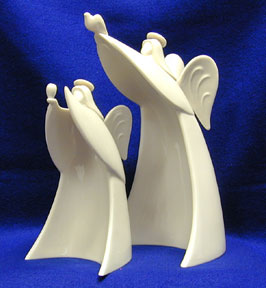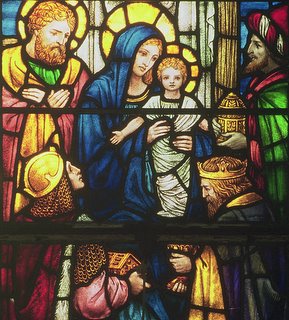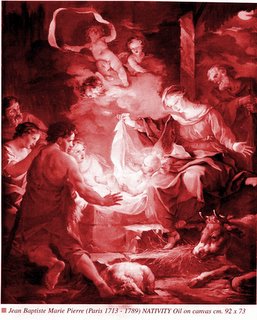ADVENT
kudos to wikipedia
Advent
From Wikipedia, the free encyclopedia.
Jump to: navigation, search
Advent (from the Latin Adventus, sc. Redemptoris, "the coming of the Saviour") is a holy season of the Christian church, the period of preparation for the celebration of the Nativity of Christ, or Christmas. It is the beginning of the Christian year (except in the Eastern churches, whose year begins on September 1).
In Eastern Orthodox churches — where it is also called the Nativity Fast, Winter Lent, or the Christmas Lent — it lasts forty days, beginning on November 15 (for those churches using the [[Julian calendar this is equivalent to November 28), and in other churches from the Sunday nearest to St. Andrew's Day (30th of November) until Christmas. It is uncertain at what date the season began to be observed. A canon of a council at Saragossa in 380, forbidding the faithful to be absent from church during the three weeks from the 17th of December to the Epiphany, is thought to be an early reference to Advent. The first authoritative mention of it is in the Synod of Lerida (524), and since the 6th century, it has been recognized as the beginning of the Western ecclesiastical year.
In Western Christianity, Advent begins on the fourth Sunday before Christmas. The earliest Advent can begin is November 27 and the latest is December 3. Very often Advent begins on the Sunday after the American Thanksgiving. Technically speaking, Advent ends on December 23. However, if December 24, Christmas Eve, should fall on a Sunday, the Sunday obligation for Catholics to attend Mass still applies, and it is treated as the Fourth Sunday of Advent, and the Vigil of Christmas is commemorated in the Mass. If December 24 occurs during the week, it is not a part of Advent; the Mass of the Vigil is said.
From the 8th century the season was kept as a period of fasting as strict as that of Lent (commencing in some localities on 11 November; this being the feast day of St. Martin, the fast became known as "St. Martin's Fast" or "St. Martin's Lent"), but in the Anglican and Lutheran churches this rule was relaxed, with the Roman Catholic Church doing likewise later, but still keeping Advent as a season of penitence. In addition to fasting, dancing and similar festivities were forbidden, and to the present day, in accordance with the symbolism of liturgical colours, purple vestments are worn at the church services, although in recent years blue has gained favour, an apparent revival of the Sarum Rite, which dates from medieval England (Sarum being the Latin name for Salisbury, where the custom of using blue vestments at this time of year originated). In the Eastern churches, red is used.
With the view of directing the thoughts of Christians to the first coming of Christ as Saviour, and to his second coming as Judge, special lessons are prescribed for each of the four Sundays in Advent, which are traditionally celebrated with four candles, often on an Advent wreath, with one to be lit each Sunday. The first, second and fourth are purple (or blue), but the third is often pink, to represent Gaudete Sunday with a less sombre liturgy.
In many countries, Advent was long marked by diverse popular observances, some of which still survive. Thus in England, especially in the northern counties, there was a custom (now extinct) for poor women to carry around the "Advent images", two dolls dressed to represent Jesus and the Blessed Virgin Mary. A halfpenny was expected from every one to whom these were exhibited, and bad luck was thought to menace the household not visited by the doll-bearers before Christmas Eve at the latest.
In Normandy, farmers employed children under twelve to run through the fields and orchards armed with torches, setting fire to bundles of straw, and thus it is believed driving out such vermin as are likely to damage the crops. In Italy, among other Advent celebrations, is the entry into Rome in the last days of Advent of the Calabrian pifferari, or bagpipe players, who play before the shrines of the Mary, the mother of Jesus. The Italian tradition being that the shepherds played these pipes when they came to the manger at Bethlehem to pay homage to the Messiah.
![]()
style="float:left; margin:0 10px 10px 0;cursor:pointer; cursor:hand;" src="http://photos1.blogger.com/blogger/2123/1084/320/Nativity-Lg800.jpg" border="0" alt="" />
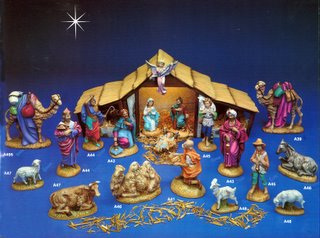
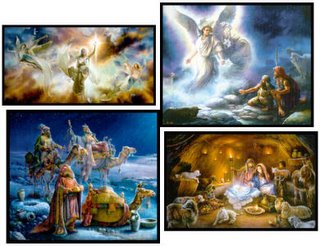
Advent
From Wikipedia, the free encyclopedia.
Jump to: navigation, search
Advent (from the Latin Adventus, sc. Redemptoris, "the coming of the Saviour") is a holy season of the Christian church, the period of preparation for the celebration of the Nativity of Christ, or Christmas. It is the beginning of the Christian year (except in the Eastern churches, whose year begins on September 1).
In Eastern Orthodox churches — where it is also called the Nativity Fast, Winter Lent, or the Christmas Lent — it lasts forty days, beginning on November 15 (for those churches using the [[Julian calendar this is equivalent to November 28), and in other churches from the Sunday nearest to St. Andrew's Day (30th of November) until Christmas. It is uncertain at what date the season began to be observed. A canon of a council at Saragossa in 380, forbidding the faithful to be absent from church during the three weeks from the 17th of December to the Epiphany, is thought to be an early reference to Advent. The first authoritative mention of it is in the Synod of Lerida (524), and since the 6th century, it has been recognized as the beginning of the Western ecclesiastical year.
In Western Christianity, Advent begins on the fourth Sunday before Christmas. The earliest Advent can begin is November 27 and the latest is December 3. Very often Advent begins on the Sunday after the American Thanksgiving. Technically speaking, Advent ends on December 23. However, if December 24, Christmas Eve, should fall on a Sunday, the Sunday obligation for Catholics to attend Mass still applies, and it is treated as the Fourth Sunday of Advent, and the Vigil of Christmas is commemorated in the Mass. If December 24 occurs during the week, it is not a part of Advent; the Mass of the Vigil is said.
From the 8th century the season was kept as a period of fasting as strict as that of Lent (commencing in some localities on 11 November; this being the feast day of St. Martin, the fast became known as "St. Martin's Fast" or "St. Martin's Lent"), but in the Anglican and Lutheran churches this rule was relaxed, with the Roman Catholic Church doing likewise later, but still keeping Advent as a season of penitence. In addition to fasting, dancing and similar festivities were forbidden, and to the present day, in accordance with the symbolism of liturgical colours, purple vestments are worn at the church services, although in recent years blue has gained favour, an apparent revival of the Sarum Rite, which dates from medieval England (Sarum being the Latin name for Salisbury, where the custom of using blue vestments at this time of year originated). In the Eastern churches, red is used.
With the view of directing the thoughts of Christians to the first coming of Christ as Saviour, and to his second coming as Judge, special lessons are prescribed for each of the four Sundays in Advent, which are traditionally celebrated with four candles, often on an Advent wreath, with one to be lit each Sunday. The first, second and fourth are purple (or blue), but the third is often pink, to represent Gaudete Sunday with a less sombre liturgy.
In many countries, Advent was long marked by diverse popular observances, some of which still survive. Thus in England, especially in the northern counties, there was a custom (now extinct) for poor women to carry around the "Advent images", two dolls dressed to represent Jesus and the Blessed Virgin Mary. A halfpenny was expected from every one to whom these were exhibited, and bad luck was thought to menace the household not visited by the doll-bearers before Christmas Eve at the latest.
In Normandy, farmers employed children under twelve to run through the fields and orchards armed with torches, setting fire to bundles of straw, and thus it is believed driving out such vermin as are likely to damage the crops. In Italy, among other Advent celebrations, is the entry into Rome in the last days of Advent of the Calabrian pifferari, or bagpipe players, who play before the shrines of the Mary, the mother of Jesus. The Italian tradition being that the shepherds played these pipes when they came to the manger at Bethlehem to pay homage to the Messiah.
style="float:left; margin:0 10px 10px 0;cursor:pointer; cursor:hand;" src="http://photos1.blogger.com/blogger/2123/1084/320/Nativity-Lg800.jpg" border="0" alt="" />


